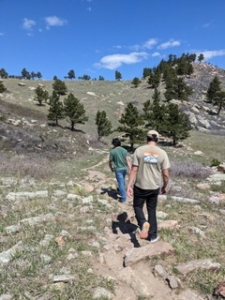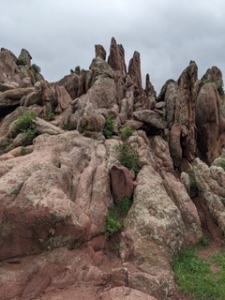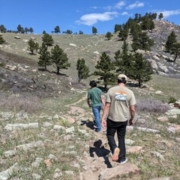Exposure to Nature is Part of the Program
 Nature can improve mental health and sharpen our cognition. “From a stroll through a city park to a day spent hiking in the wilderness, exposure to nature has been linked to a host of benefits, including improved attention, lower stress, better mood, reduced risk of psychiatric disorders, and even upticks in empathy and cooperation,” wrote Kirsten Weir on the website of the American Psychological Association in 2020. “Nature comes in all shapes and sizes, and psychological research is still fine-tuning our understanding of its potential benefits… Experimental findings show how impressive nature’s healing powers can be—just a few moments of green can perk up a tired brain.”
Nature can improve mental health and sharpen our cognition. “From a stroll through a city park to a day spent hiking in the wilderness, exposure to nature has been linked to a host of benefits, including improved attention, lower stress, better mood, reduced risk of psychiatric disorders, and even upticks in empathy and cooperation,” wrote Kirsten Weir on the website of the American Psychological Association in 2020. “Nature comes in all shapes and sizes, and psychological research is still fine-tuning our understanding of its potential benefits… Experimental findings show how impressive nature’s healing powers can be—just a few moments of green can perk up a tired brain.”
The campus of Colorado Recovery is only a short distance from the spectacular landscape of the Centennial State. The great outdoors around Boulder can be both challenging and have a calming effect on our clients—utilizing it is definitely part of our treatment programs for schizophrenia, bipolar disorder, and other mental illnesses.
After initially working in transitional housing at Colorado Recovery, Peter Kamback recently took on his new role as a vocational rehabilitation specialist. “Most clients are from out of state and have not experienced a spectacular environment like the Colorado Rockies,” he explains. “We have hiking trails within walking distance of our campus—trails that accommodate all hiking levels and difficulties.”
Kamback values the human connection with clients such outings can offer. “We are able to expose them to things they haven’t seen before and enrich their lives that way. These kinds of activities give them direction and purpose and enhance things that are good in their lives. We shift focus to wellness away from thinking about their illness all the time.”
Vocational services include socialization and recreational activities such as weekly hikes, game and movie nights, talent shows, community and relationship building, as well as opportunities for teamwork and conflict resolution.
“On a weekly basis, one day is designated for hiking, one for the art group, one for health and wellness, and so forth,” Kamback says. “Outdoor activities allow them to relax and let down their guard a little bit and really enjoy being in scenic Colorado. Being able to offer these outdoor activities is a huge value for our clients.”
 Clients even get to make arrangements to hike with their peers without Colorado Recovery staff coming along. “I think that’s huge for them,” says Kamback. “All the benefits of nature while being more present and calm gives them a little more confidence to interact with others.”
Clients even get to make arrangements to hike with their peers without Colorado Recovery staff coming along. “I think that’s huge for them,” says Kamback. “All the benefits of nature while being more present and calm gives them a little more confidence to interact with others.”
Excursions to the local art museum can be equally therapeutic. They are great opportunities “to see clients in a more natural setting and get a better sense of them as persons rather than patients,” says Kamback who has an art degree. “You experience them as people in a public location and also note how they interact with each other.”
Empowering clients is central to the treatment model developed by Colorado Recovery founder Richard Warner. “Treatment should include social rehabilitation,” wrote Dr. Warner in The Environment of Schizophrenia. “People with schizophrenia usually need help to improve their functioning in the community. This can include training in basic living skills; assistance with a host of day-to-day tasks; and job training, job placement, and work support.”
And the self-esteem necessary to succeed in the wider community can be built up on a wilderness trail. At Colorado Recovery it is our mission to help adults with serious mental health issues stabilize their illness, minimize symptoms, improve functioning, and enhance each person’s social inclusion, quality of life, and sense of meaning in life.
If you have questions about our recovery model or our services to treat schizophrenia, bipolar disorder, and similar mental illnesses, call us at 720-218-4068 to discuss treatment options for you or the person you would like to help.





